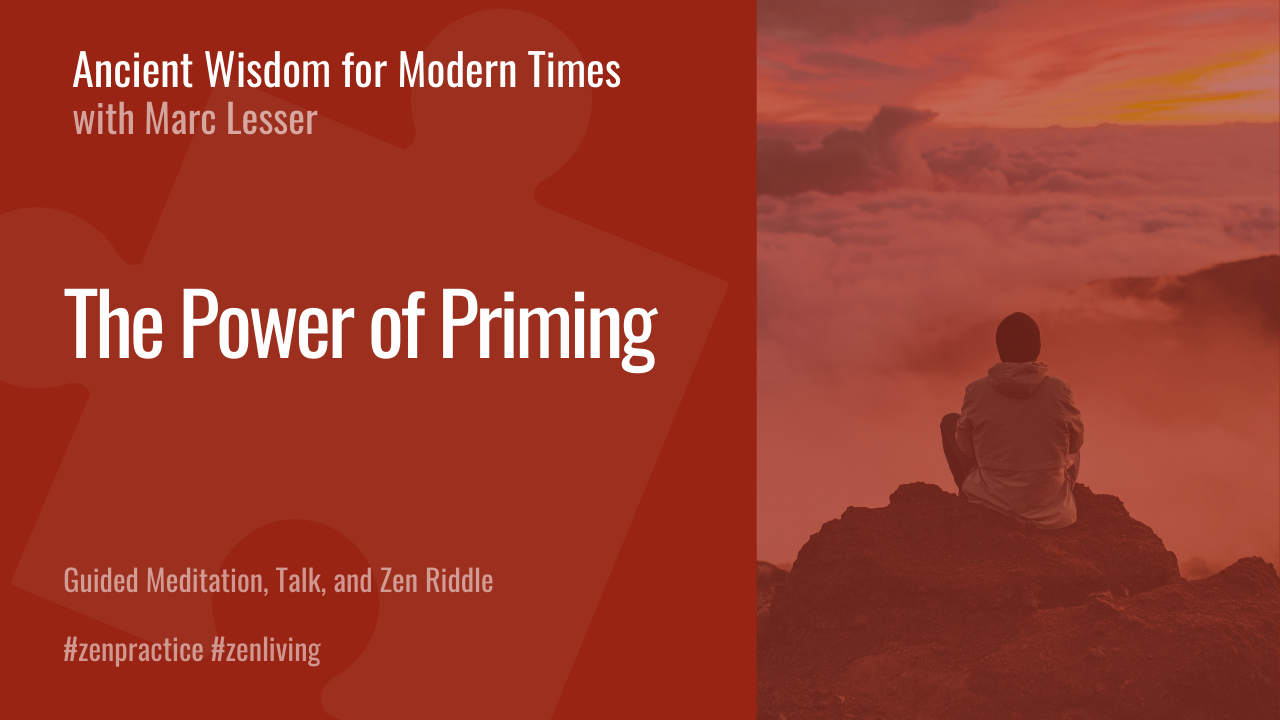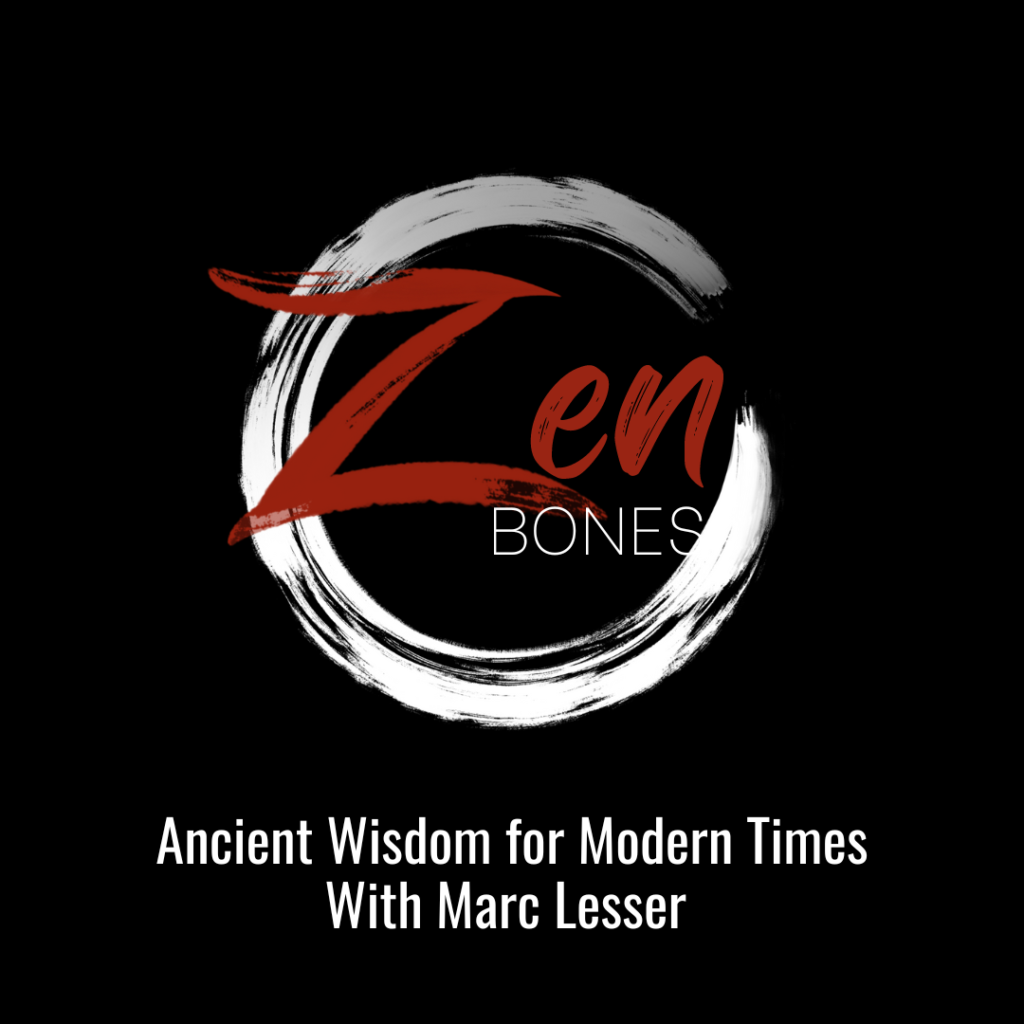Today’s podcast features The Power of Priming. We begin with a short meditation. Then Marc talks about how the world tends to prime us for anxiety and speed. As an antidote and practice, we can prime ourselves to be present, open, curious, and creative. Meditation practice is a form of priming. We can utilize priming in all parts of our days, from waking up to starting meetings.
Today’s Zen puzzler is based on a quote about staring and impermanence.
EPISODE TRANSCRIPT
Marc Lesser: Welcome to Zen Bones. This is Marc Lesser. Zen Bones is a bi-weekly podcast featuring conversations with leading teachers and activists and an exploration of Zen teachings and practices. Please support our work by making a donation at marclesser.net/donate.
[theme music]
Marc: Today’s podcast features the power of priming. We begin with a short guided meditation, and then I talk about how the world tends to prime us for anxiety and speed. As an antidote and practice, we can prime ourselves to be more present, open, curious, and creative. Meditation practice is a form of priming and we can utilize priming in all parts of our days, from waking up to starting meetings, to any place. Today’s Zen Puzzler is based on a quote about staring and impermanence. I hope you enjoy today’s episode. Let’s do some sitting practice together.
[gong chime]
Marc: Simply stopping. Pausing. Arriving. Just being here. I was saying to someone that I like to start these days my morning meditations with breathing in and breathing in and in and holding my breath, filling up my lungs to capacity, and then exhaling. I was, I was shown this method many years ago in Japan by, I think it was a 93-year-old Zen priest who said this was the secret to his longevity was this daily practice of lung, breath, breathing to capacity, holding the breath, so let’s do that. Simply breathing in and in and in and holding. Holding the breath and whenever you’re ready, releasing and exhaling. Maybe again, breathing in and in and in and in and filling up the lungs and holding, holding, holding, and whenever you’re ready, releasing.
[silence]
Now, just being here with the breath, with the body. Letting go as much as possible of our to-do lists, any sense of comparisons and judgments. Hitting the reset button on our lives right now. Arriving, emptying out, emptying out. Nothing to gain, nothing to lose. Just being fully here. Fully here. No other place. Here, no other time than now. Here, filled with emptying out and filling up with appreciation, with gratitude for being here, alive. Beyond any sense of wholeness or lack of wholeness, radically whole, radically generous.
Acknowledging how much we are given here to receive and to give, receiving and giving. Nothing hidden, nothing folded. Open to receive, open to give. Host and guest, host and guest at the same time. No difference. Keeping it simple. Just coming back to the breath, to the body with radical appreciation. Warm hearted, warm hearted curiosity. I am going to shift gears. You are welcome to continue sitting or stay with me. Whichever feels right for now.
[gong chime]
[theme music]
Marc: I want to talk about priming, the power of priming. In some way, meditation practice is many things, but in some way, it is priming ourselves for warm-hearted curiosity, priming ourselves to live, to think and live and act in a more warm-hearted way, a less dualistic way. Less getting caught by the usual right and wrong or this and that. Of course, of course, we need to, we do live in the ordinary world where right and wrong matter and this and that matter, and our to-do lists matter. There’s something about readying ourselves, priming ourselves, contextualizing things in a way where we emphasize what really matters.
What really matters are our own spirit, our own readiness. Readiness of mind and readiness of heart. There are some really interesting studies that you might be familiar with about priming. There’s one where a group of college students, these were, they were 18 to 22-year-olds, were asked to make sentences using these, using five words. One group was given words like find, it, he, yellow, instantly. Another group were given words that evoked a sense of old age, words like bald, forgetful, Florida, gray, wrinkles.
Then, following this task, each person was instructed to walk down a hallway to participate in another study. In this study, the researchers very unobtrusively measured how long it took for each person to walk. Those who had the old age words like Florida and forgetful and bald took significantly more time to walk down the hallway than the other group. This is the power of priming, and this was called the Florida effect. How simply working with, simply engaging with words that evoke being older influence people’s behavior, influence their thinking even when they had no conscious awareness of the connection. They were asked if they were aware of it, and they weren’t.
Then there was another study in which participants, again, were filling out a form and were asked to make copies. They went to the copy machine and the researchers for one group left a dime on the copy machine. The participants in this study who found the dime reported afterwards that their moods were significantly better moods. We were priming for finding, for receiving. Again, this was a little bit like the meditation that we did earlier is somewhat, in a way, it’s priming ourselves to, we don’t need to find a dime, we can find the eyes of a child or our own hand, or the trees outside, or the sunshine and clouds. We are being gifted. We are being gifted everywhere. It’s using the practice of priming.
We often prime ourselves for a horrendous day or for anxiety, or for what’s missing. Again, this is partly the power of the negativity bias. This more positive priming can be an antidote to the negativity bias, but can also be much more than that. We can consciously use the power of priming to cultivate more awareness, more calmness, more focus. We can prime ourselves by what we read, by what we watch, by the words that we use, and the environment that we create.
We can prime ourselves to be more open-hearted, more empathic, more creative. Of course, we can prime ourselves for stress and anxiety as well. Just being aware, being aware of the power of priming, noticing the words and images in our space, and making sure, as much as we can, to bring in the kinds of words, images that we aspire to. How do we want to show up? How do we want to live?
I was remembering I used to spend a lot of time teaching mindfulness at Google. There was a meeting that was called by some of the leadership at Google and wanted to know, how could we more deeply, more sustainably change the culture here. These were the leaders who were in charge of this mindful leadership program. They were directors fairly high up in the Google hierarchy, wanting to know how, who sincerely wanted to know how to make these kinds of culture changes.
We talked about how in practice places, we were referring back to places like Tassajara. Any practice place, everywhere you look, there is this priming for settling in images of Buddhas and beautiful artwork and flowers, and that there is some conversation about how to do this within the Google workplace to put more of these images. In practice places, in Zen places, it’s everywhere you look. There is an altar by the bathrooms, an altar. You walk into the kitchen or into the meditation hall. People generally put these little images and altars in their rooms.
It’s recognizing, treating, making space sacred, making space more accessible. Then, so it’s a priming ourselves for sacredness. I know when you walk into the kitchen at Tassajara, the first thing that is a beautiful altar in the center of the kitchen with some images. There are these three Japanese characters with the words, joyful mind, grandmother mind, and big mind. Again, this comes from an essay written by Dōgen, the founder of Zen in Japan in the 13th century, who said that the head cook should always be practicing with these three minds. Again, it’s this sense of priming.
You might notice in your own home, in your office, in your workplace, what might you do to prime for, whether it’s maybe some combination of the sacred and creativity, or beauty, or connection. You might have some conversations with the people you work with or live with about the power of priming. You might think about how do you want to prime yourself in some of the core transitions, starting your day. Maybe noticing your first breath, noticing your first breath with a sense of warm-hearted curiosity. Noticing as you get up, putting your feet down on the ground, being aware of priming yourself for awareness.
In starting meetings, one of the things that is being experienced and practiced with more and more is starting meetings with 30 seconds or a minute of silence. This is, again, I think, a way of priming for listening, priming for the sacred, priming for bringing more awareness. You can do this even in a meaningful conversation. Again, priming. Priming for the sense of connection and whole-heartedness.
I was struck by a priming study that I saw that concluded that even the word money somehow primes people for a kind of anxiety. Interesting to notice just how sensitive we are and how much we’re influenced. I think it’s interesting. My life as a business person and as a Zen teacher, and I think we are all, we’re all business people. I think we’re all, if not Zen teachers, we’re all Zen students. Zen to me is just a word that means
how to be a full human being. We all are practicing how to be a full human being, whether we call it Zen or not, and we’re all business people, again, whether we’re in business or not because we all have to deal with the practical things of paying the bills and money and to-do lists. It’s interesting to see how we are influenced by the world of money and to be able to bring in the sense of the sacred, the wholehearted equanimity and calmness and to be priming ourselves priming ourselves for creativity, for showing up, for connection right in the midst of the world that is regularly priming us for fear and anxiety and lack, and so I think this is the power and importance of being aware of and practicing with this sense of positive priming.
Welcome to the Zen Bones puzzler where I will regularly be presenting a story or a Zen poem or a poem, something to contemplate to think about. A story that has purpose. It’s about developing greater insight and reflection, not so much for a solution but as a way to support your practice. A kind of meditation in daily life. I’m happy to do today’s Zen puzzler where I have been bringing in traditional Zen kōan or Zen stories and looking at how to make them more relevant in relevant useful, powerful, influential in our daily lives.
I like to bring in what the non-traditional Zen stories or Zen kōans and today’s is one of my favorite quotes that keeps popping up in my in my life. I don’t even remember when I first came across it but I was really struck by it and it’s something that I want to share today, which is a quote by the photographer, Walker Evans, who there’s a collection of his photography that I remember I first came across I think I was a freshman at college at Rutgers when I think this book was assigned for a psychology class or a sociology class, and it’s photographs from the Depression era.
Beautiful striking poignant photographs of people who are people who are struggling, and there was a way that Walker Evans captured the combination of the pain and possibility. The beauty and the longing of this era the era of the Great Depression in the late 1920s – 1930s throughout the United States. This quote, something that Walker Evans said is, “Stare. It will change the way you see and more. Stare, pry, listen, eavesdrop. You are not here long. Die knowing something,” and every word in this, to me, this is like, this quote is like a Zen kōan because we’re typically told not to stare.
We’re told not to stare and I’m fond of this the power of staring. Meditation maybe is a little bit like staring and to listen so deeply, so deeply that the way that we look, the way that we listen changes how we show up. Stare, pry, listen, eavesdrop, and again, combining this with the shortness of our lives. You are not here long. Die knowing something. I love this imperative. Die knowing something is a potent motivator to value how we spend our time to enter fully this moment, this thought this action.
I’m reminded I’ve been I’ve been struggling. I’ve been struggling to become much more proficient than I am in Spanish, and a woman friend of mine who is a native Spanish speaker, she started speaking to me in Spanish and I looked at her and said, “I don’t speak Spanish yet,” and she looked at me and she said, “Marc, apply yourself. Apply yourself,” and I’ve been applying myself more not only in Spanish but I’ve been applying myself in my meditation practice, in my study, in my work, in my relationships. Again, this is, I think, this practice of staring. This practice of pry, listen, eavesdrop, so interesting how to open to and practice with.
You might practice with what does it mean to stare? What does it mean to pry and listen, or you are not here long, die knowing something. It’s a little bit like the Carlos Castañeda of living with death. Death living on our left shoulder as he, I think that comes from one of his early books. A separate reality. A book that moved me, changed me, influenced me when I was in college. Stare, it will change the way you see and more. Stare, pry, listen, eavesdrop. You are not here long. Die knowing something. Thank you very much.
[theme music]
Marc: I hope you’ve appreciated today’s episode. To learn more about my work and my new book, Finding Clarity, you can visit marclesser. net. This podcast is offered freely and relies on financial support from listeners like you. Please donate at marclesser.net/donate. Thank you very much.
[theme music]
[00:28:01] [END OF AUDIO]









